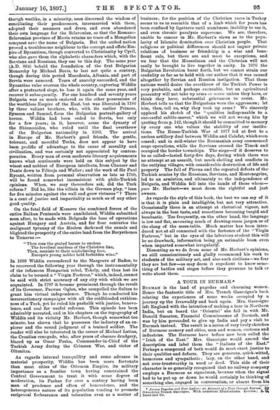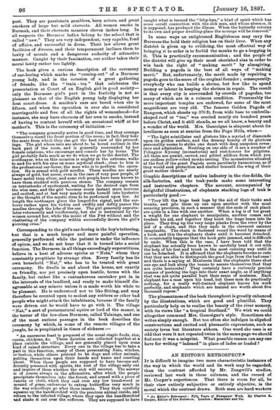A TOUR IN BURMAH.*
BIIRMAH is the land of pagodas and charming women. Hence the fantastic title of Mrs. Trench Gascoigne's book relating the experiences of some weeks occupied by a journey up the Irrawaddy and back again. Mrs. Gascoigne left England with the intention of making a tour in Northern India, but on board the 'Oriental' she fell in with Mr. Donald Smeaton, Financial Commissioner of Burmah, and was by him persuaded to give up India and pay a visit to Burmah instead. The result is a series of very lively sketches of Burmese scenery and cities, men and women, customs and industries. The Burmese have before now been called the "Irish of the East." Mrs. Gascoigne would amend the description and label them the "Italians of the East." Perhaps a compound of both would do most exact justice to their qualities and defects. They are generous, quick-witted, humorous and sympathetic; lazy, on the other hand, and not over-trustworthy in word or deed. This aide of their character is so generally recognised that no railway company employs a Burmese as signalman, because when the signal had to be put up or down he would certainly be thinking or something else, engaged in conversation, or absent from his • Among Pagodas and Fair Ladies: an Account of a Tour throuoh Burma: t Corendalen Trench Gatcoigne. With numerous Illustrations. London; a, tunes and Co.
post. They are passionate gamblers, born actors, and great smokers of large but mild cheroots. All women smoke in Burmah, and their cheroots measure eleven inches long. In all respects the Burmese ladies belong to the school that is called " new." They are very independent, very capable, fond of affairs, and successful in dress. Their law allows great facilities of divorce, and their temperament inclines them to laxity of morals and a dangerous audacity of attractive manner. Caught by their fascination, our author takes their moral laxity rather too lightly.
The book gives a curious description of the ceremony of ear-boring which marks the " coming-out " of a Burmese young lady, and is the occasion of a great gathering of friends, like the "train - tea" that celebrates the presentation at Court of an English girl in good society— only the Burmese girl's part in the festivity is not so pleasant as that of the English young lady displaying her first court-dress. A maiden's ears are bored when she is fifteen, and when the operation is over she is considered marriageable and free of all the rights of womanhood—for instance, she may have cheroots of her own to smoke, instead of having to content herself with an occasional whiff at her mother's. This is the ceremony of initiation :—
"The company generally arrive in good time, and they arrange themselves round the front portion of the room; in fact, they take the seats from which they can get the best view of the proceed- ings. The girl whose ears are about to be bored reclines in the back part of the room, and is generally surrounded by her female relations, who encourage and console her by turns. The girl probably feels much as we do when we go to the dentist. The soothsayer, who on this occasion is mighty in the extreme, walks to and fro with his eyes on some mystical chart ; close to him is the professional ear-borer, the man who is to perform the opera- tion. He is armed with gold needles. These needles are nearly always of gold, but never, even in the case of very poor people, of baser metal than silver, and some rich people have been known to have them studded with precious stones. The company remain on tenterhooks of excitement, waiting for the desired sign from the wise man, and the girl becomes every instant more nervous and excited, and at last very nearly works herself into hysterics at the thought of the mystic rites to be performed upon her. At length the soothsayer gives the longed-for signal, and the ear- borer rushee upon his victim and swiftly and deftly passes the needles through the lobe of the ear. The girl generally expostu- lates vehemently and vociferously, but she is restrained by the women around her, while the music of the Pw6 without and the chattering of the company within successfully drown the girl's piercing cries."
Corresponding to the girl's ear-boring is the boy's tattooing, but that is a much longer and more painful operation, generally performed while the patient is under the influence of opium, and we do not hear that it is turned into a social function. The Burmese, in all things exceedingly superstitious, believe in a host of adverse spirits or "Nate," whom they constantly propitiate by strange rites. Every family has its • own household "Nat," who has to be treated with great ceremony. He dwells in and about the house, not exactly on friendly, nor yet precisely upon hostile, terms with the family, but rather like a cantankerous caretaker put in in the interests of the landlord, and ready to make himself dis- agreeable at any minute unless it is made worth his while to be pleasant. He is understood not to like flitting, and may therefore be counted upon to molest any robbers or other bad people who might attack the inhabitants, because if the family were driven out he would have to go with it. The village "Nat," a sort of preternatural squire or lord of the manor, is the 'terror of the low-class Burmese, called Talaings, and one of the most curious passages in the book describes the ceremony by which, in some of the remote villages of the jungle, he is propitiated in times of sickness :—
"An enormous feast is prepared of the usual staple foods, rice, currie, chickens, &c. These dainties are collected together at a
place outside the village, and are generally placed upon some
kind of raised structure. Every one in the village has to take a part in this function, many of them personating Nats, witches, or beeloos, while others pretend to be dogs and other animals, putting themselves upon their hands and knees and crawling about. When these people are supposed to have become suf- ficiently possessed with spirits, the rest of the village sally out and inquire of them whether the sick will recover. The answer as of course always in the affirmative, after which the people precipitate themselves into the forest, and armed with a piece of canvas or cloth, which they cast over any low brushwood or mound of grass, endeavour to entrap butterflies very much in the way schoolboys go after these insects. They then carefully squeeze .up the handkerchief with the precious animal inside, and tett.= to the infected village, where they open the handkerchief and shake it out over the sufferers. They are supposed to have
caught what is termed the " lehp-bya," a kind of spirit which has some occult connection with the sick man, and whose absence, it is supposed, has produced the illness. When the butterfly returns to its own and proper dwelling-place the scourge will be removed."
In some ways an enlightened Englishman may envy the Burmese the hold their religion has on their livee.. When any district is given up to evildoing, the most effectual way of bringing it to order is to forbid the monks to go a-begging in it. This is practically excommunication ; and the people of the district will give up their most cherished sins in order to win back the right of "making merit" by almsgiving. Building a pagoda is the best of all ways of "making merit." But, unfortunately, the merit made by repairing a pagoda goes to the score of the original founder ; consequently. everybody who can builds a shrine, but few like to spend money or labour in keeping the shrines in repair. The result is that every city is surrounded by crowds of pagodas, too many of which are in a ruinous condition. Presumably the more important temples are endowed, for some of the most magnificent are very old. The famous Golden Pagoda of Rangoon, which shoots up 370 ft. from wide base to umbrella- shaped roof or "tee," was erected nearly six hundred years before Christ, and it still stands, as we all know, a beauty and a wonder of the world. Mrs. Gascoigne is eloquent about its loveliness as seen at sunrise from the Pegu Hills, when- " The light scintillates and glistens like a myriad of diamonds upon its golden surface, and the dreamy beauty of its glorious personality seems to strike one dumb with deep unspoken rever- ence and admiration. Nestling on one side of it are a number of Pohngyee Kyoung (monasteries) and rest-houses for pilgrims. All these are quaint, carved, and gilded edifices from which you see endless yellow-robed monks issuing. The monasteries situated at the foot of the great Pagoda seem peculiarly harmonious, as if they would seek protection and shelter beneath the wing of their great mother church."
Graphic descriptions of native industry in the rice-fields, the silk-factories, and the teak-yards make some interesting and instructive chapters. The account, accompanied by delightful illustrations, of elephants stacking logs of teak is particularly good :—
"They lift the huge teak logs by the aid of their tusks and trunks, and pile them up one upon another with the most amazing precision, in such a manner that the ends of each plank are quite in a line with one another. When a log is of too great a weight for one elephant to manipulate, another comes and tenders his aid, and together they hoist the huge beam into its place. They drag up the very large planks from the river by the aid of a chain, and this they undo in the cleverest manner imaginable. The chain is fastened round the wood by means of a hook, and this the elephants shake until it becomes detached. It occasionally happens that the hook gets jammed, and is difficult to undo. When this is the case, I have been told that the elephant has actually been known to carefully bend it out with the help of his feet and trunk in the most cunning way. until it can be detached. It is affirmed that the elephants become so cute that they are able to distinguish the good logs from the bad ones ! and there is a saying at l!daulmein that the elephants there shut one eye and look along the beams to assure themselves that they are quite horizontal! They certainly have a curiously precise manner of pushing the logs into their exact angle, as if anything that was not quite parallel hurt their sense of neatness. Each elephant has a man upon his head, but these men do practically nothing, for a really well-trained elephant knows his work perfectly, and elephants which are trained are worth about five thousand rupees."
The pleasantness of the book throughout is greatly enhanced by the illustrations, which are good and plentifuL They particularly help us to realise the beauty of the river scenery, with its views like "a tropical Scotland." We wish we could altogether commend Mrs. Gascoigne's style. Sometimes she writes simply enough. But too often she indulges in slipshod constructions and excited and pleonastic expressions, such as society loves but literature abhors. One word she uses is so odd that were it not repeated twice in the same page we should feel sure it was a misprint. What possible reason can any one have for writing " ladened " in place of laden or loaded







































 Previous page
Previous page